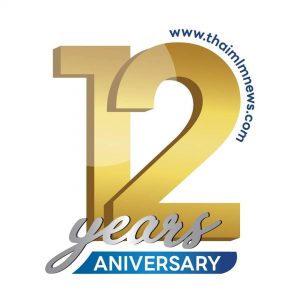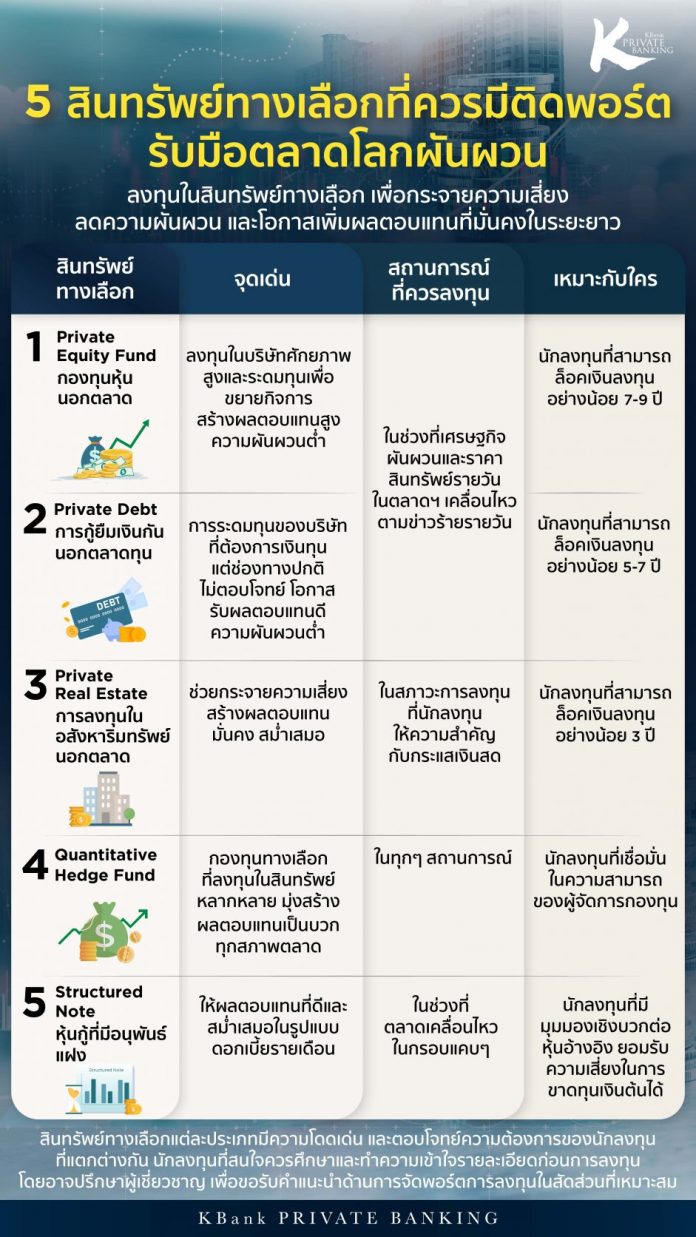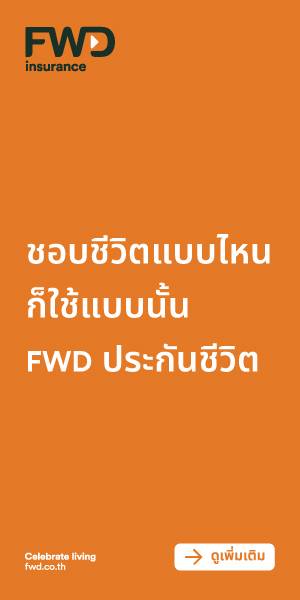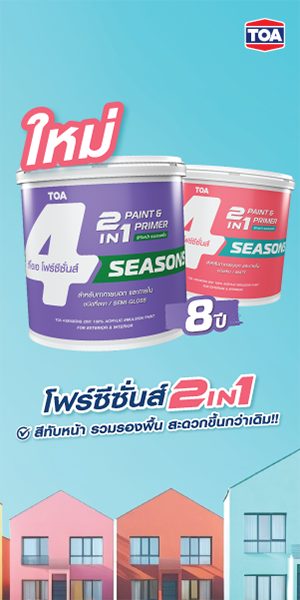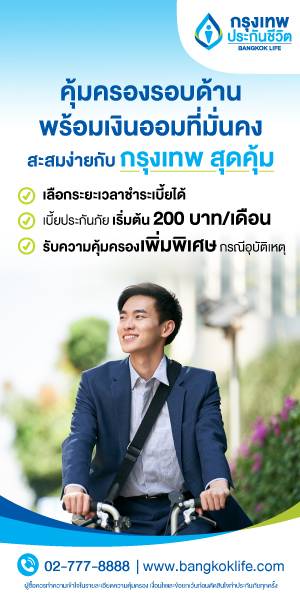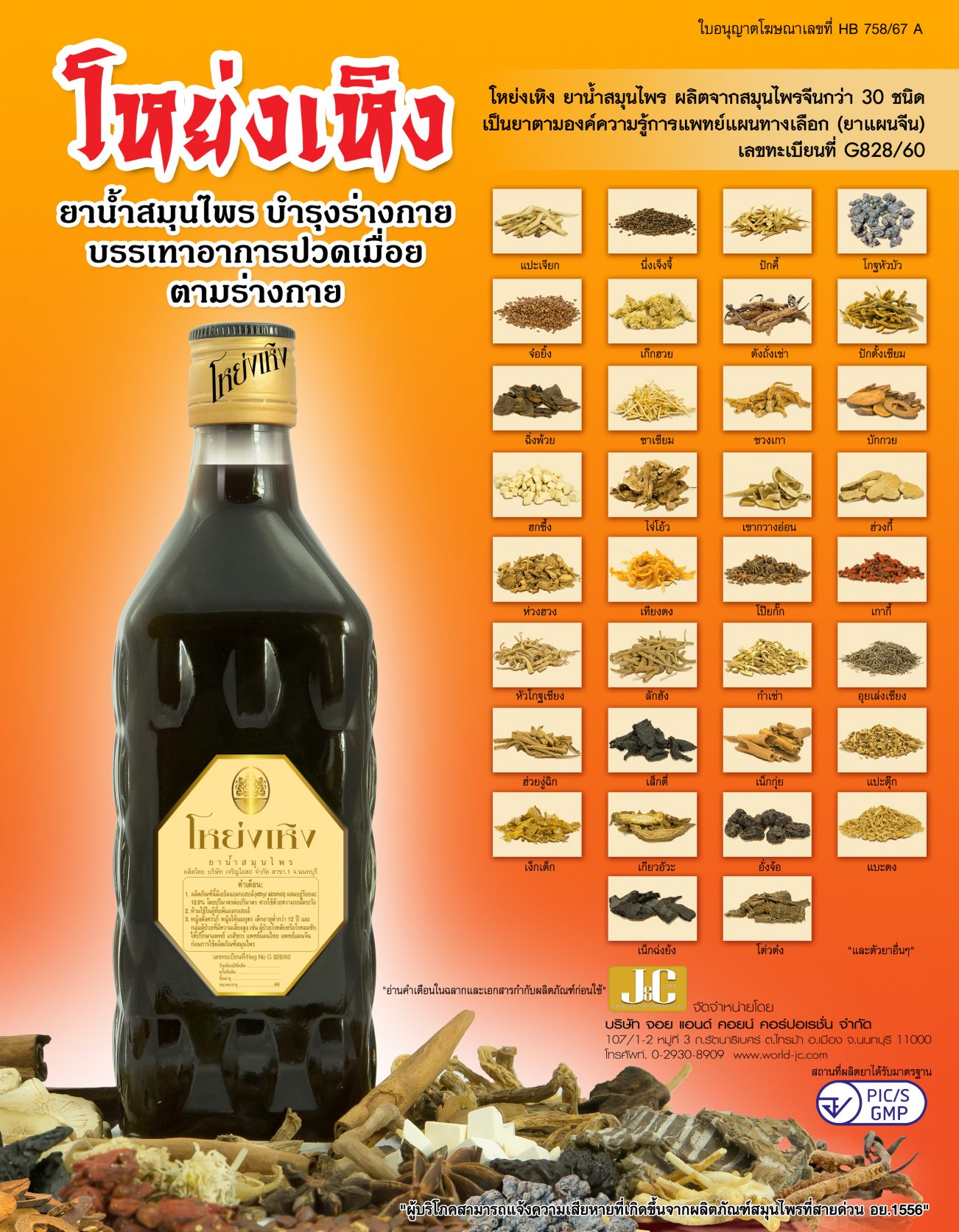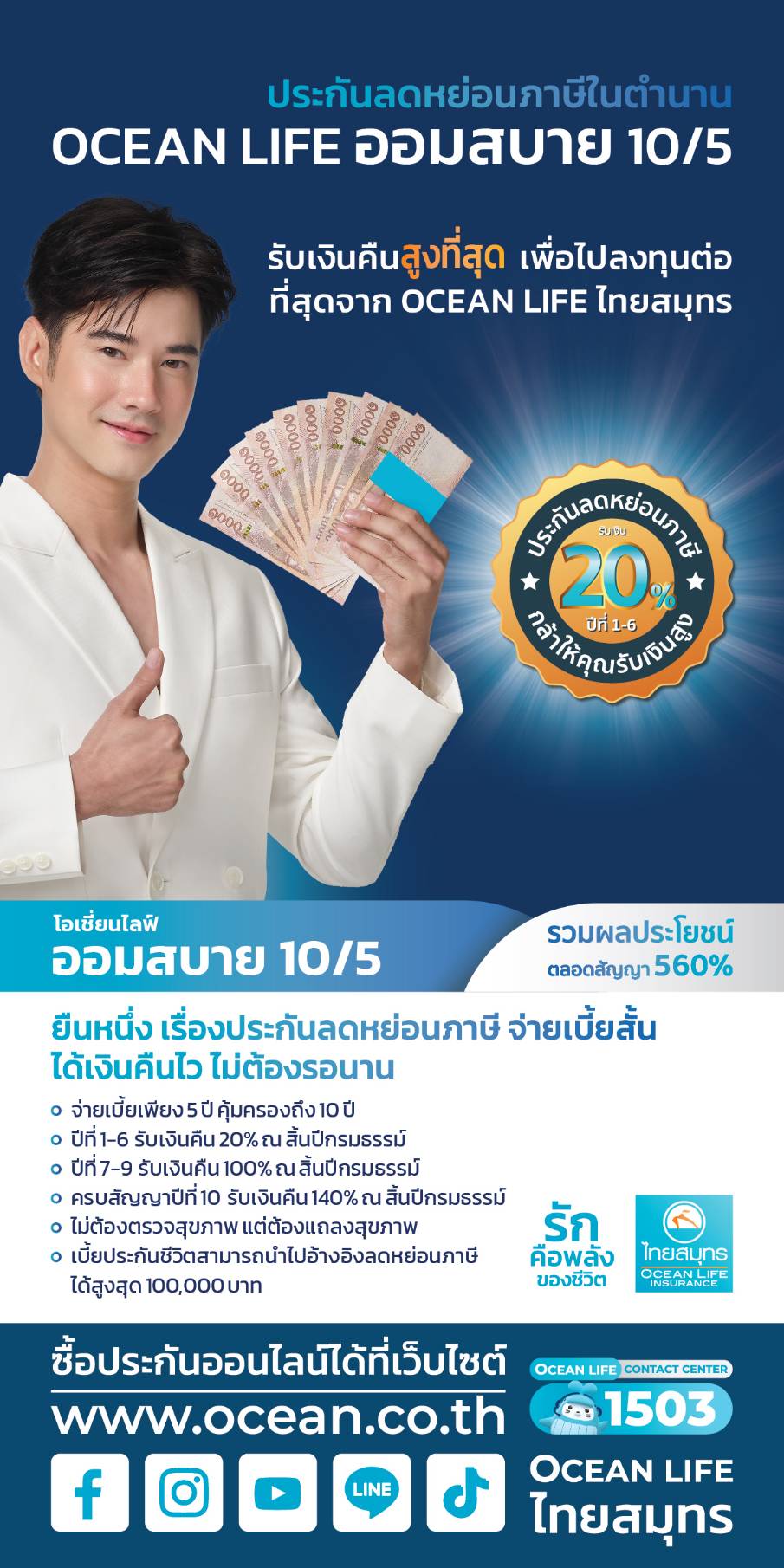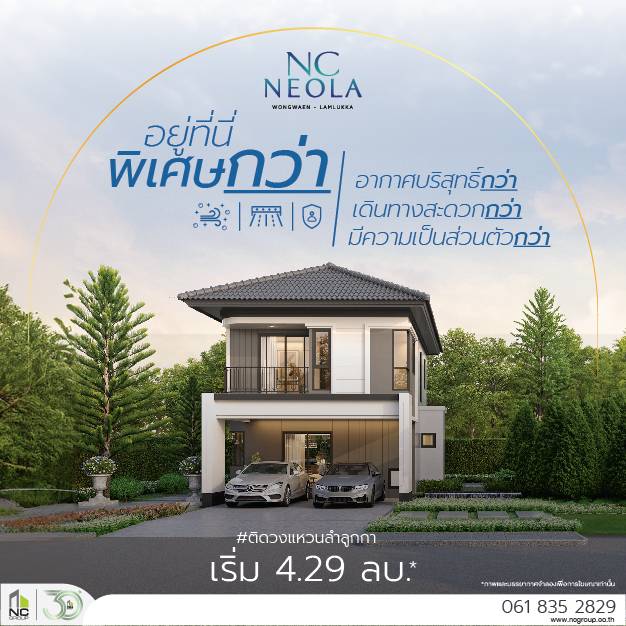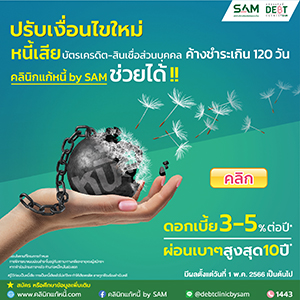KBank Private Banking (เคแบงก์ ไพรเวทแบงกิ้ง) เผยกลยุทธ์การลงทุน ผ่าน 5 สินทรัพย์ทางเลือก (Alternative Assets) เพื่อ “เพิ่มทางเลือก แนะทางรอด” ให้กับพอร์ตการลงทุนในยุคเศรษฐกิจผันผวน ที่การลงทุนรูปแบบเดิมไม่อาจตอบโจทย์อีกต่อไป พร้อมชูความสำเร็จจากผลการดำเนินงานเฉลี่ยที่โดดเด่นราว 11-19% ต่อปี ตอกย้ำบทบาทที่ปรึกษาด้านการลงทุนและการบริหารความมั่งคั่งชั้นนำของไทย

ดร.ตรีพล ภูมิวสนะ Senior Managing Director, Private Banking Business Head ธนาคารกสิกรไทย กล่าวว่า “ท่ามกลางความไม่แน่นอนทางเศรษฐกิจที่พุ่งสูงขึ้น สินทรัพย์ดั้งเดิมที่เคยมี ไม่อาจสร้างผลตอบแทนที่น่าพอใจได้ นักลงทุนจึงต้องแสวงหาโอกาสในการลงทุนรูปแบบใหม่ เพื่อเพิ่มทางเลือก กระจายความเสี่ยง และสร้างผลตอบแทนที่มั่นคงในระยะยาว การลงทุนในสินทรัพย์ทางเลือก หรือ Alternative Assets จึงเป็นอีกหนึ่งทางเลือกที่กลายเป็นทางรอดให้กับนักลงทุนทั่วโลก ด้วยกลยุทธ์การบริหารการลงทุนที่มีความยืดหยุ่นสูง ไปจนถึงราคาของสินทรัพย์นอกตลาดที่ไม่เกี่ยวข้องกับการเคลื่อนไหวของตลาดทุน จึงสะท้อนปัจจัยพื้นฐานของแต่ละสินทรัพย์อย่างแท้จริง KBank Private Banking ในฐานะผู้นำและผู้เชี่ยวชาญด้านการลงทุนและการบริหารความมั่งคั่ง จึงเล็งเห็นถึงศักยภาพการลงทุนที่เติบโตนี้ และได้แนะนำให้กับลูกค้ามาอย่างต่อเนื่องตั้งแต่ปี 2564 เพื่อเสริมแกร่งพอร์ตการลงทุนแม้ในยามตลาดผันผวน”
สินทรัพย์ทางเลือกที่ KBank Private Banking แนะนำประกอบไปด้วย 5 สินทรัพย์ประเภท โดยแบ่งเป็นสินทรัพย์นอกตลาด 3 ประเภท และสินทรัพย์ในตลาดที่มีความยืดหยุ่นในการกลยุทธ์การลงทุนอีก 2 ประเภท ดังนี้
1. Private Equity
กองทุนหุ้นนอกตลาดที่ไม่ได้จดทะเบียนซื้อขายในตลาดหลักทรัพย์ เน้นลงทุนในบริษัทที่กำลังระดมทุนเพื่อขยายกิจการและมีศักยภาพในการเติบโตสูง เนื่องจากราคาของหุ้นนอกตลาดไม่มีราคารายวันที่เคลื่อนไหวตามความตื่นตระหนกของตลาดทุนตามปกติ รวมถึงผลตอบแทนที่เกิดขึ้นก็สะท้อนจากปัจจัยพื้นฐานจริงๆ ของบริษัทที่ลงทุนอยู่ โดยรวมจึงมีโอกาสสร้างผลตอบแทนที่ดี ขณะที่ความผันผวนทางด้านราคาในระยะสั้นช่วงตลาดตื่นตระหนกก็ต่ำกว่า อย่างไรก็ดี ก็จะต้องแลกมาด้วยระยะเวลาการลงทุนที่จะถูกล็อคไว้ ขึ้นอยู่กับระยะเวลาในการสร้างการเติบโตของบริษัท สินทรัพย์ประเภทนี้จึงเหมาะกับนักลงทุนที่สามารถลงทุนในระยะยาวอย่างน้อย 7-9 ปี
2. Private Debt
เปรียบเสมือนการกู้ยืมเงินกันนอกตลาดทุน ซึ่งเป็นการระดมทุนทางเลือกสำหรับบริษัทที่ต้องการต่อยอดธุรกิจแต่อาจจะไม่สามารถเข้าถึงเงินทุนตามปกติ เช่น การกู้ยืมจากธนาคาร หรือบริษัทที่ต้องการความรวดเร็วในการระดมทุน โดยนักลงทุนจะได้รับอัตราดอกเบี้ยที่สูงกว่า ท่ามกลางสภาวะแวดล้อมดอกเบี้ยขาขึ้นในปัจจุบันจึงยิ่งน่าสนใจ แต่ก็ต้องแลกกับความเสี่ยงด้านสภาพคล่องที่ต่ำกว่าการลงทุนในพันธบัตรรัฐบาล หรือหุ้นกู้เอกชนทั่วไปที่สามารถซื้อขายต่อได้ในตลาดทุน สินทรัพย์ประเภทนี้จึงเหมาะกับนักลงทุนที่สามารถลงทุนในระยะยาวอย่างน้อย 5-7 ปี
3. Private Real Estate
การลงทุนในอสังหาริมทรัพย์นอกตลาด หรือโครงสร้างพื้นฐานที่ไม่ได้จดทะเบียนในตลาด เช่น อาคารสำนักงาน ไฟฟ้า และโทรคมนาคม สามารถช่วยกระจายความเสี่ยงจากการลงทุนในตลาดที่มีความผันผวนได้เช่นกัน โดยอสังหาริมทรัพย์ที่มีอัตราการเช่าสูง ช่วยให้ผู้ลงทุนมีโอกาสรับผลตอบแทนในรูปแบบค่าเช่าที่สม่ำเสมอ เหมาะกับภาวะการลงทุนในปัจจุบันที่นักลงทุนให้ความสำคัญกับการได้รับกระแสเงินสดที่มั่นคง และสม่ำเสมอ โดยส่วนมากจะแนะนำลงทุนระยะยาว 3 ปีขึ้นไป
4. Quantitative Hedge Fund
กองทุนทางเลือกที่กลยุทธ์การลงทุนยืดหยุ่นมาก ส่วนมากจะต้องเชื่อฝีมือผู้จัดการกองทุนเป็นหลัก โดยมีความมุ่งหวังที่จะสร้างผลตอบแทนเป็นบวกตลอดเวลาไม่ว่าสถานการณ์ของตลาดจะเป็นเช่นไร โดยกองทุนสามารถลงทุนในสินทรัพย์หลากหลายประเภท และมักมีการใช้กลยุทธ์ขายชอร์ต (Short) ที่สามารถทำกำไรได้ในตลาดขาลงด้วยการยืมสินทรัพย์มาขายก่อน แล้วไปซื้อสินทรัพย์มาคืนในภายหลังในราคาที่ต่ำลง หรือการใช้ตราสารอนุพันธ์ในการเพิ่มอัตราทดเหมือนกับการการยืมเงินมาลงทุน (Leverage) รวมถึงใช้กลยุทธ์ที่ซับซ้อนด้วยกระบวนการทางคณิตศาสตร์และสถิติจากข้อมูลเชิงปริมาณ เป็นต้น โดยรวมจึงเปรียบเสมือนเครื่องมือที่ช่วยเพิ่มมิติให้กับพอร์ตการลงทุน ทั้งด้านเพิ่มผลตอบแทน และกระจายความเสี่ยง
5. Structured Note
หุ้นกู้ที่มีอนุพันธ์แฝง คือ ผลิตภัณฑ์ทางการเงินที่ผสมผสานคุณสมบัติของหุ้นกู้และตราสารอนุพันธ์ด้วยกลไกการลงทุนที่อ้างอิงกับราคาสินทรัพย์ หรือปัจจัยที่เกี่ยวพันกับการเปลี่ยนแปลงของตลาดในหลากหลายรูปแบบ เช่น ดัชนีหุ้น และอัตราแลกเปลี่ยนเงินต่างประเทศ เป็นต้น โดยผลิตภัณฑ์ที่นิยมกันในหมู่นักลงทุนไทย คือ หุ้นกู้ที่มีอนุพันธ์แฝงแบบ Knock-In Knock-Out หรือ KIKO ที่สามารถเลือกอ้างอิงผลตอบแทนได้ทั้งตะกร้าหุ้นไทย หรือหุ้นต่างประเทศ ซึ่งจะให้ผลตอบแทนดีในช่วงที่ตลาดเคลื่อนไหวในกรอบแคบๆ และสามารถให้ผลตอบแทนในรูปแบบดอกเบี้ยรายเดือนที่สม่ำเสมอได้
สินทรัพย์แต่ละประเภทมีความโดดเด่น และสามารถตอบโจทย์ความต้องการของนักลงทุนที่แตกต่างกันได้เป็นอย่างดี นักลงทุนที่สนใจการลงทุนในรูปแบบนี้ จึงควรเริ่มจากการศึกษาและทำความเข้าใจรายละเอียดก่อนการลงทุน โดยอาจปรึกษาผู้เชี่ยวชาญ เพื่อขอรับคำแนะนำด้านการจัดพอร์ตการลงทุนในสัดส่วนที่เหมาะสม ทั้งนี้ โดยปกติแล้วสินทรัพย์ทางเลือกจะลงทุนเป็นสัดส่วนไม่เกิน 10% ของพอร์ตการลงทุนทั้งหมด เพราะ จุดประสงค์หลักมีไว้เพื่อกระจายความเสี่ยง
“จากผลการดำเนินงานในปีที่ผ่านมา ผลิตภัณฑ์การลงทุนในสินทรัพย์ทางเลือกที่มีความโดดเด่น และสามารถสร้างผลตอบแทนที่เป็นที่น่าพอใจให้กับลูกค้าได้ ท่ามกลางความผันผวนของตลาด ได้แก่ กองทุนหุ้นนอกตลาด หรือ Private Equity ด้วยอัตราผลตอบแทนเฉลี่ยที่สูงถึง 19% ต่อปีสำหรับกองทุน K-GPE19A-UI โดยตลอดช่วงครึ่งปีหลังนี้ KBank Private Banking ยังคงมุ่งมั่นที่จะแนะนำผลิตภัณฑ์ทางเลือกการลงทุนอย่างต่อเนื่อง ครอบคลุมทั้งในและต่างประเทศ และสอดคล้องไปกับธีมการลงทุนแห่งอนาคต อย่าง Global Private Debt (ตราสารหนี้นอกตลาดทั่วโลก) Global Private Equity (กองทุนหุ้นนอกตลาดทั่วโลก) Global and Local Private Real Estate (อสังหาริมทรัพย์นอกตลาดทั้งทั่วโลก และในประเทศไทย) Quantitative Hedged Fund Strategy (กองทุน Hedge Fund ที่ใช้กลยุทธ์การลงทุนด้วยกระบวนการคณิตศาสตร์และสถิติจากข้อมูลเชิงปริมาณ) และ Exotic Structured Note (หุ้นกู้ที่มีอนุพันธ์แฝงแบบต่างๆ) เพื่อเป็นทางรอดให้กับนักลงทุนต่อไป” ดร.ตรีพล กล่าวปิดท้าย
KBank Private Banking recommends investment in alternative assets which are attractive and resilient amid volatile market environment
KBank Private Banking (KPB) has announced its investment strategies, focusing on five alternative assets in order to “Increase Options for Survival” in an era of economic volatility wherein conventional investment may not be the right answer. KPB showcased its success as evidenced by its stellar performance with return on investment of around 11-19 percent p.a. This achievement reinforces KPB’s status as Thailand’s top-notch investment and wealth management advisory service provider.
Dr. Triphon Phumiwasana, Senior Managing Director, Private Banking Business Head, KASIKORNBANK (KBank), noted, “Amid highly uncertain economic circumstances, traditional asset classes may no longer provide satisfactory returns. Investors have therefore switched to new forms of investment as alternative vehicles for risk diversification and long-term stable returns. To survive market volatility, global investors have invested in alternative assets thanks to their highly flexible investment management strategies. Given that prices of private assets are not tied to capital market movements, therefore they reflect real fundamentals of each asset class. As a leading investment and wealth management advisory service provider, KPB has recommended that our clients invest in alternative assets since 2021 to capitalize on their growth potential while also guarding against market volatility.”
KBank Private Banking recommends the five following asset classes, comprising three types of private assets and two types of public assets with flexible investment strategies. They are, i.e.,
1. Private Equity
Private Equity (PE) is typically an investment fund which is not listed on a public stock exchange. Private equity funds mainly invest in companies with high growth potential seeking to raise funds for business expansion. Unlike public stock markets which tend to fluctuate out of emotion-driven market sentiment, PE prices are not quoted on a daily basis, and their returns typically reflect real fundamentals of the companies they are invested in. Given this, private equity potentially provides attractive returns with relatively low price fluctuations over the short term period. However, investors may have to measure this advantage against the need for a lengthy investment period, mostly depending on the growing stage of the invested companies. Therefore, private equity is suitable for long-term investors who can hold their investment for at least seven to nine years.
2. Private Debt
Private Debt is like a loan provided outside the capital market as an alternative form of fund mobilization for companies wishing to expand their businesses. However these companies are unable to gain access to funds per the normal course of business such as loans provided by banks, or for companies wishing to quickly mobilize funds. Therefore Investors will enjoy higher returns amid the current upward trend in interest rates, although they may have to trade that off for relatively low liquidity compared to investment in government bonds or debentures that are typically traded in the capital market. This asset class is suitable for investors who can invest over at least five to seven years.
3. Private Real Estate
Investment in Private Real Estate or basic infrastructure that is not listed on a public stock market such as office buildings, and electricity and telecommunication projects, can help diversify risks in a volatile market, as well. Properties with high rental rates offer investors a greater opportunity to enjoy steady returns. Investment in Private Real Estate is ideal for present investment conditions as it offers investors stable cash flows. Long-term investment of at least three years is recommended.
4. Quantitative Hedge Fund
Quantitative Hedge Fund is an alternative fund with greater flexibility in investment strategy. Trust must be placed primarily on the skills of fund managers as they anticipate positive returns regardless of any market conditions. Quantitative Hedge Fund can invest in a diverse range of asset classes and typically uses a short-selling strategy to make profits during market downturns by borrowing assets to sell first before repurchasing them later at a lesser value or using derivatives to boost the leverage rate or other more complicated strategies, based on mathematical and quantitative statistical methods. Overall, a quantitative hedge fund can serve as a tool to add new dimensions to investment portfolios in terms of returns and risk diversification.
5. Structured Note
Structured Note is a financial instrument combining the key features of debentures and derivatives. Its investment mechanism is based on asset prices or factors related to market changes in various forms such as stock index, foreign exchange rate, etc. For instance Structured Note products that are preferred among Thai investors are knock-in knock-out (KIKO) structured notes with Thai or foreign stocks as underlying assets. They will offer good returns at a time when the market is moving in a narrow range, and can provide regular returns in the form of monthly interest.
Subsequently each asset class is outstanding and can well meet the different needs of investors. Interested investors should study and understand investment details thoroughly or consult professionals for advice on appropriate investment portfolio allocation. In normal practice, alternative assets make up no more than 10 percent of a total portfolio, as their main purpose is risk diversification.
In closing, Dr. Triphon noted, “According to operating results of last year, our alternative asset investment product with outstanding performance and satisfactory returns amid market volatility was K-GPE19A-UI fund, a private equity fund, which offered an average return of up to 19 percent per annum. Throughout the second half of this year, KBank Private Banking is determined to continually introduce additional alternative investment products both domestically and internationally, and in alignment with investment themes of the future, namely Global Private Debt, Global Private Equity, Global and Local Private Real Estate, Quantitative Hedge Fund Strategy and Exotic Structured Note, as investment options.”


